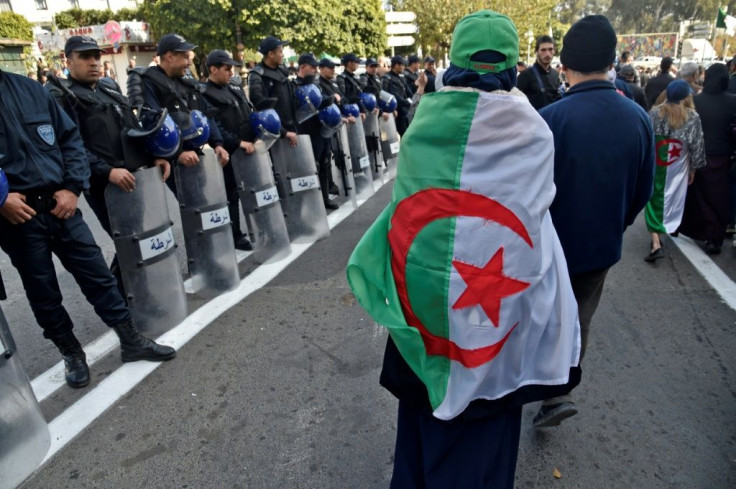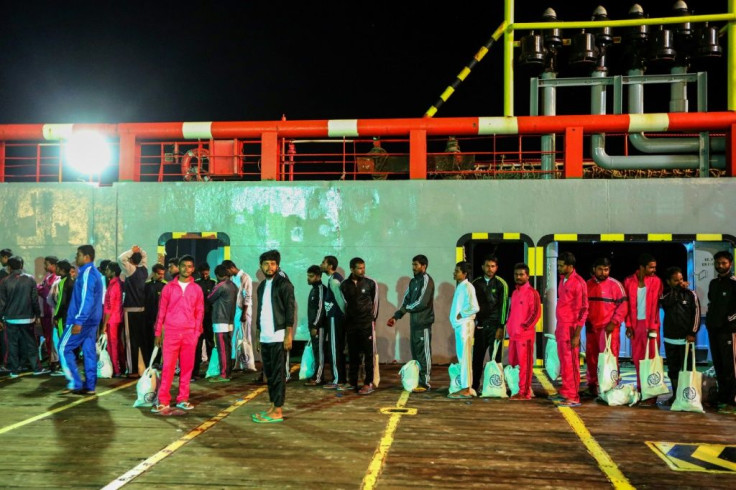Political Stagnation And Virus Galvanise Maghreb Migrants

"Here, I don't exist -- I die little by little," said Hamid, a young Algerian, his gaze fixed on Mediterranean waters he sees as his route to a better future.
"My only hope is to leave for Europe."
Like thousands of citizens from the Maghreb, the 28-year-old has chosen to risk his life by crossing the Mediterranean on a makeshift boat.
With the coronavirus pandemic further squeezing already scant economic opportunities, Algerians and Tunisians are more determined than ever to reach Europe.
The deadly nature of their gamble was underlined again this month when 60 people, mostly women and children, drowned off the Tunisian coast.
But this has not put Hamid off.
An engineer by profession, he has work, but is forced to live with his parents because his salary is not enough to rent a separate apartment.
His friends Djamel and Mohamed are also set on making a seaborne bid from Annaba, a northeastern city that is a popular launchpad for illicit crossings to Europe.
The migrants are known locally as "harraga", "those who burn" -- a reference to successful travellers setting their identity papers alight upon reaching their chosen destination, to avoid repatriation.
A protest movement that started early last year and quickly toppled longtime president Abdelaziz Bouteflika had sparked young people's hopes for a better future at home.
But as the unprecedented peaceful movement has been ever more harshly repressed and the oil-dependent economy has tanked on low crude prices, illegal departures have ticked up again.
Djamel said that with people being arrested for simply "posting opinions on Facebook", making for the seas "has become a question of survival".
Algerian defence ministry figures show authorities arrested 1,433 people trying to depart illegally from Algeria's shores in the first five months of this year -- more than three times the figure for the same period of 2019.
The monthly numbers of detentions dropped dramatically from 828 in January to just 16 in March, as the country's coronavirus outbreak kicked in.
But Kouceila Zerguine, a lawyer based in Annaba, is convinced that actual migrant departures from Algeria are anyway far higher than the official figures.
"You have to multiply that number by 20," because you have to account for those who actually complete their trip without being intercepted, Zerguine said.

Sociologist Mohamed Mohamedi said the Hirak protest movement had offered citizens brief "hope of shaping a life" in Algeria.
But, he said, "the return of the 'harraga' is due to the return of hopelessness".
Mahrez Bouich, a professor of philosophy and politics in Bejaia in northeastern Algeria, agreed that the lack of hoped-for changes, along with economic stagnation, were to blame.
The pandemic has "exacerbated social inequalities and injustices", Bouich said.
Despite a 2009 law that punishes migrants intercepted at sea with six months in prison (five years for smugglers), growing numbers of Algerians are attempting the crossing -- often more than once.
Aboard the boats are doctors, nurses, policemen, the unemployed and entire families, lawyer Zerguine said, arguing that the phenomenon cannot be explained by unemployment alone.
Those who decide to leave "want to live with the times, they want more freedom and dignity".
Mohamed, the prospective migrant, said Algeria's social conservatism had overlooked young people.
"My grandparents are more open in spirit than my parents -- it's mad," he said.
"Society has regressed and I refuse to regress with it."
In neighbouring Tunisia, clandestine departures towards Europe quadrupled in the first five months of the year compared to 2019, according to the UN refugee agency UNHCR.
And while a growing number of migrants attempting the crossings are from West Africa, Tunisians also appear to have ever more reason to leave.
Many are disillusioned with the aftermath of the country's 2011 revolution, while the coronavirus pandemic has further crushed their economic prospects, said Khaled Tababi, a sociologist specialising in migration.
Many jobs have simply disappeared, especially in the tourism sector, he said.
Said El Ketari, an unemployed 28-year-old from the Sfax region of central-east Tunisia, stayed in Italy illegally for seven years before he was expelled in 2019.
Ever since his unwanted arrival home, he has been eyeing the chance to cross the Mediterranean again.
"Living in a foreign country hit by the pandemic is easier than living here without money, without prospects and with the unemployment that strangles us," he said.
© Copyright AFP {{Year}}. All rights reserved.




















